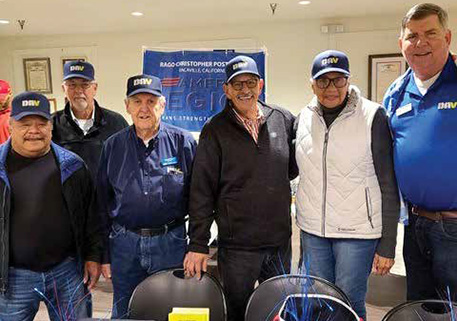Veterans required to repay debt to the Department of Veterans Affairs, often find themselves caught off guard or surprised to learn some of their income has been garnished. The Veterans Fair Debt Notice Act of 2017—H.R. 3705—aims to alleviate that burden.
The legislation would require the Secretary of Veterans Affairs to utilize certified mail and plain language in certain debt collection activities.
Assistant National Legislative Director LeRoy Acosta testified on behalf of DAV at a hearing held before the House Committee on Veterans’ Affairs, Subcommittee on Disability Assistance and Memorial Affairs, on Sept. 13. Acosta testified that the organization supports the draft legislation, as it aligns with DAV Resolution No. 213—voted on by membership at the 2017 National Convention in New Orleans.
“We applaud the provision in the bill requiring a plain language explanation of why the debtor owes money,” testified Acosta. “The overpayment and debt process can be confusing, complex and overwhelming to many veterans who are left guessing as to why the debt was created. A simple and plain explanation should be required in all debt notifications.”
“Whenever a veteran’s situation changes, maybe they’re no longer married or they go back on active duty, the VA has to be notified to adjust the veteran’s monthly benefits,” said National Service Director Jim Marszalek. “If a veteran fails to notify VA, or VA doesn’t receive the change in a timely manner, the overpayments are due back to VA as a debt.”
Sometimes the error is on VA, but often the veteran may be unaware an overpayment and debt was created until money is deducted from their compensation check. In some cases, the garnished compensation causes undue financial hardship on veterans. The Veterans Fair Debt Notice Act of 2017 proposes to ensure veterans understand what debt collection actions will be taken with a plain language explanation of the debt.
However, as Acosta testified, DAV does have some concerns regarding the bill as written. Under current law, veterans have 30 days from the date of the debt notification letter to either submit a written dispute of the debt, a written request for a waiver or a written request for a hearing on the waiver. The new proposal doesn’t specify whether this protocol will be affected.
Additionally, DAV recommends the proposed bill add language to clarify the date of notification, specifically—that the date the veteran receives the notification letter through certified mail becomes the official “notification” date, rather than the date written on the notification letter itself. In his testimony, Acosta also requested clarification on which party will be required to utilize certified mail.
“Right now the legislation appears to require the veteran to submit their response via certified mail, as it requires VA to notify the veteran,” said Acosta. “We don’t believe that’s fair, as that process may not be easily accessible for many veterans. While we do agree VA should be required to send debt notifications to veterans via certified mail, the veteran should not bear that same obligation.”
Finally, DAV asked the Subcommittee to consider DAV Resolution No. 213, which calls for alleviating undue financial hardship on the veteran debtor through a waiver of debt in cases when processing of the veteran’s change in status is delayed by VA for 90 days or more after timely notification by the veteran of such change.
“Resolution 213 requires VA to respond to veterans’ status changes in a timely manner in order to prevent the veteran from falling into debt in the first place,” said DAV National Legislative Director Joy Ilem. “We think including this waiver provision into the Veterans Fair Debt Notice Act of 2017 is a fair solution to a continued problem veterans face related to VA overpayment and debt collection efforts.”






